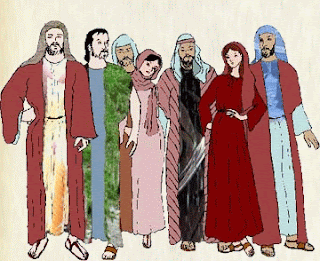Mark 5:21-43
Who doesn’t love a good bargain? I know
I certainly do. When I see the advertisement, “Buy One, Get One Free” I just
have to stop and take a second look. And if one item is 50% off, I figure that
means if I buy two at 50% off each, I’ve just saved myself some money, right? –
Well, only if I need two, I guess.
Today’s gospel delivers two healing stories – two miracles of Jesus, within this one text of Mark’s. I was going to post “Two
for the Price of One” as the title for my sermon today. But advertising a
sermon with a title like that on a
church website might be a little counterintuitive.
 While we could all probably use a
double-dose of God’s grace most days,
what you probably don’t want is a 90
minute sermon.
While we could all probably use a
double-dose of God’s grace most days,
what you probably don’t want is a 90
minute sermon. 
 |
| Healing of a Bleeding Woman, Peter Marcellinus Catacomb |
All kidding aside, our God is a gracious and generous God whose love is transforming and healing, whose grace, freely flowing through Jesus, brings us new life.
Today’s gospel texts contain stories of that
grace demonstrated in Jesus performing miraculous
healing, taking power from death and giving new life and transformation to
those who suffer.
Most of us have some personal experience with healing, be it physical, emotional,
spiritual, or relational. Some of us may even have stories of miraculous healing – healing that we
ourselves experienced or healing that has occurred to others we know.
Maybe there was a restoration to health
that could not be explained any other
way than, “miracle”; healing that took place which was out of proportion to anything that was expected, or a cure that took place where none was expected at all.
I think that most of us probably know
that there are times when healing comes with a cure, and times when a person is
cured of a disease but still consumed by demons of another kind.
All
of us could probably tell the other
kind of stories as well – the stories of those who prayed, or for whom we have prayed, where there was no cure,
and no apparent healing.
We admit that the ways of God are both
mysterious and challenging.
This truth, however, often makes healing
stories like those in Mark’s gospel this morning difficult for us to comprehend,
and difficult for us to hear, reminding us of those other stories from our own experience as they do.
We don’t fully understand why some
people are healed or cured and others are not. There are those who laugh us to
scorn for faith in the power of God to heal, especially when healing doesn’t
happen the way we want it to.
Today we have these two-for-one healing
stories in our gospel narrative. Each of these stories presents healing a
little differently, each includes a miracle, each exhibits the twin forces of
fear and faith which often seem to go hand in hand.
What these
stories do NOT teach us, is that if
we simply have enough faith, miracles
will happen, healing will automatically
occur, and we will get whatever we
ask.
This gospel does not say that illness is
a test of faith or that with the
right kind of faith we automatically
get our wish and receive a cure when we pray.
Instead, what these stories testify to
is the transformational presence and power of God, working through Jesus
Christ. These stories invite us to take all the fear, sadness, grief and pain
we feel in the face of our brokenness, our illness and even death itself and
turn them over to God. And God, who promises to accompany us through the chaos
and turmoil of our human finitude will transform our fear, giving us faith,
strength, and yes, healing.
In our text today, Jesus has once again
crossed the sea, returning from the Gentile side where he has just cast out
demons from a Gerosene man. The sea, figuring prominently in the gospel, reminds
us of the powers of chaos and darkness, a boundary Jesus not only crosses but
ultimately overcomes.
We remember last week’s gospel story of
the calming of the storm at sea which illustrated for us how Jesus brings calm
to the turmoil and chaos of our world and our lives.
As Jesus reaches the shore in today’s
text, a huge crowd assembles around him and follows him, pressing him in on all
sides. There is something symbolic in the way that Jesus stands between the
people and the depths and chaos of the sea.
What follows is this two-for-one story.
First, we have Jairus – well connected, Jewish,
but vulnerable to losing the daughter who is so dear to him. He may be used to
getting what he wants – he is a man of power and prestige, after all. He may not
really know what to think of Jesus but he’ll try anything to save his daughter. He calls out to him, revealing for
all to see, his deep vulnerability and need.
Then, we have the unnamed woman – she has
lost all status and whatever money she may have had during the twelve long
years of her affliction. She doesn’t have a thing going for her except for her
faith.
She is desperate too. Like Jairus, she may
not know exactly who this Jesus is or how he works, but she has heard the healing
and teaching stories and believes that there is something about him, some way
that God is working through him. And so, she
presses through the crowd.
Can
you feel the bodies pressing against her from all sides? Can you see her
stretch out her hand, reaching, reaching, and then finally touching just the fringe of Jesus’ clothing – the only thing she dares touch, and even that in secret.
She
likely fears that if she calls out to Jesus and asks him to help her, the crowd,
thinking she is out of her mind, will laugh her to scorn, will chase her away –
or worse. Her bleeding has left her ritually, sexually and religiously unclean.
Finally, there is the little girl,
Jairus’ precious daughter, standing at the gate to adulthood, soon to reach what
would have been an age of marriagability. On her own she has no status, no
wealth, and no power, as she hovers in the threshold between life and death.
As
Jesus and the others reach her home, they are told that it is too late. She has
died.
Resisting the people’s call to turn back
however, Jesus proceeds to enter the home, allowing only the girl’s parents and
his most trusted companions to come with him. The people in the crowd laugh. They
think he is out of his mind.
They laugh him to scorn at the
suggestion that he can do anything to
help her now. They laugh him to scorn at the suggestion that there is any power greater than death.
As we move with these characters through
this narrative, we see the power of God moving people from death to life, transforming
fear into thanksgiving through faith, turning vulnerability to vindication
through the power of Jesus’ touch.
Jairus may not have been a believer when
he first caught Jesus’ attention; hope was all
he had, but the restoration of his little girl to life moved him to faith, made
him a believer.
The woman
experiences immediate healing and
more – she who was once nameless and without status is given a name by Jesus – “Daughter,”
he calls her – and then lifts her up as the epitome of faith. “Your faith has saved
you.” She is not only healed, but restored to community.
 |
| The Raising of Jairus' Daughter George Percy Jacomb-Hood, 1895 |
And the little
girl? Her role foreshadows Jesus’ own resurrection, revealing God’s power over even
the darkness of death.
Experiencing God’s power is
overwhelming. It is easier to believe that the trusting, hopeful, believing
ones are “out of their minds”.
These days, fear, turmoil, chaos and
death are evident every way we turn. So many people in the sphere of our lives
are touched by cancer, other incurable illnesses, addiction and brokenness
beyond belief. Terrorism, mass killings, systemic conflict and ills infect
every corner of the earth. Perhaps you or someone close to you can identify
with one of the characters in this Gospel account – desperate, vulnerable, hopeful,
or feeling hopeless.
Maybe you are the person who has it all
together but then, through illness, job loss, a broken relationship, or some
other storm suddenly finds himself vulnerable and desperate?
Or perhaps you’re the one who has
endured so much challenge or adversity over time that, like the bleeding woman
you haven’t much else to lose. Perhaps you are ready to dare to reach out,
wondering if just maybe Jesus might be
able to heal you.
Maybe you find yourself the helpless one
like Jairus’ daughter, utterly dependent on others to pray for you, to lift you
up, to fight for you?
Whichever you are, whoever you are, this gospel message is for you. God’s abundant
love displayed on the cross will show you power that is stronger than death, and love that is stronger than any
brokenness or ill.
We believe in a God who heals, and keeps right on healing
because our human nature leaves us vulnerable to illness and pain and loss. Through
the power of the Holy Spirit and the Word of God, we can learn to trust God’s
“I love you,” and to hear God’s “I know you,” claims made manifest in Jesus
Christ.
It is in community that we ourselves can
begin to become God’s vehicles of compassion, comfort and healing for others. Perhaps
the two-for-one good news of this gospel is that whether you have a strong faith
or whether you struggle to believe, or fall somewhere in the middle, God walks
alongside you as Jesus walked along the sea, holding back the chaos, and
through Jesus overcoming the powers of evil and sin. This gracious and generous
God is transforming doubt into hope, hope into faith, and bringing healing to
all. Thanks be to God.











